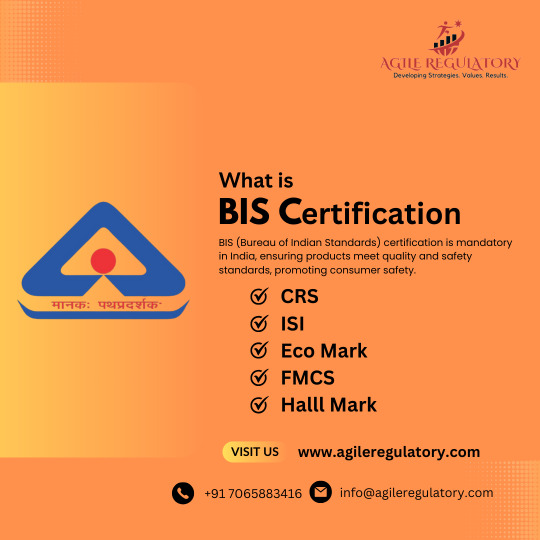Don't wanna be here? Send us removal request.
Text

BIS (Bureau of Indian Standards) certification is a mandatory quality and safety certification process in India that ensures products conform to specific standards and regulations set by the BIS. This certification is designed to guarantee that various products, ranging from electronics and appliances to industrial goods and food products, meet the established quality, performance, and reliability requirements. Manufacturers are required to obtain a BIS license, adhere to BIS standards, and label their products with the BIS mark, signifying compliance. BIS certification plays a critical role in consumer protection, product safety, and the promotion of quality standards within the Indian market, both for domestically manufactured and imported goods.
https://www.agileregulatory.com/service/bis-certification
#bis certification#bis certification for electronic products#bis hallmark certificate#bis certification list#bis registration#hallmark#fmcs#bisfmcs#bisforeignmanufacturer#bishallmark#isimark#Bisconsultant#bislicense#biscrs#bisisimark#bisforimport#biscertificationforimport
2 notes
·
View notes
Text
Introduction of BIS Regitration
In India, the Bureau of Indian Standards (BIS) is essential to ensure the safety and quality of products that are sold. For many items BIS certification sometimes referred to as BIS registration. This certification promotes consumer safety and quality assurance by attesting to a product's compliance with particular Indian requirements. We will explore the significance of BIS registration and the process involved.

What is BIS Registration?
The Bureau of Indian Standards was established in 1986 and is governed by the Government of India and the Ministry of Consumer Affairs, Food & Public Distribution. Strict safety rules and standards are followed by products that are offered in the Indian market thanks to a quality control technique known as BIS registration. It includes a broad variety of products, such as automobiles, chemicals, electronics, and more.
Types of BIS Certification:
CRS (Compulsory Registration Scheme)
ISI (Indian Standard Institutions)
FMCS (Foreign Manufacturing Certification Scheme)
Hallmark Certification
ECO Mark Certification
Importance of BIS Registration:
Consumer Safety: BIS registration helps protect consumers from substandard and potentially hazardous products. It ensures that goods meet the required safety and quality standards, lowering the possibility of mishaps or health problems.
Market Access: Because of its quality assurance, many Indian organisations and individuals choose to purchase items with the BIS certification. For manufacturers and importers, obtaining BIS registration is often a prerequisite for market access.
Compliance with Regulations: Compliance with BIS regulations is mandatory for certain product categories. Failure to obtain BIS registration can result in penalties, product recalls, and damage to a brand's reputation.
Here's a general overview of the BIS Certification process in India/BIS Registration Process:
The BIS registration process can be complex, involving various steps.
Product Selection: Determine the specific product for which you need BIS certification. BIS have various product categories and standards, so you need to identify the relevant one for your product.
Manufacturer or Importer Registration: Manufacturers or importers seeking BIS certification must register with BIS as per the BIS Act. This can be done through the BIS portal.
Application: The first step is to submit an application to the BIS for the desired product category. The application should include product details, technical specifications, and test reports.
Document Verification: BIS reviews the submitted documents to ensure they meet the required standards and guidelines.
Types of Documentation needed for BIS Certification:
PAN Card and Aadhar Card.
Electricity Bill of the firm.
Copy of GST certificate.
Certificate of incorporation.
Proof of property of premises.
Layout plan of the factory.
Detailed list of machinery involved.
Product specification.
Manufacturing flow process.
Location of the factory.
List of testing equipment and facilities.
Import Export Code (IEC).
Contact no. & E mail ID.
Sample Testing: In many cases, BIS mandates that product samples be submitted for testing to BIS-approved laboratories. The samples are tested for conformity to applicable Indian standards.
Factory Inspection: BIS may conduct an inspection of the manufacturing facility to ensure that the production process adheres to quality standards.
Evaluation: BIS will evaluate your application, review the test reports, and inspect your manufacturing unit, if necessary.
Granting of License: If the product successfully passes all tests and inspections, BIS grants the manufacturer or importer a BIS registration license. This license must be renewed annually.
Marking and Labelling: BIS-certified products must carry the ISI mark, indicating compliance with BIS standards. This mark is a sign of quality and safety for consumers.
Surveillance: BIS may conduct periodic surveillance audits to ensure that your product continues to meet the standards.
Renewal: BIS certification is typically valid for one to two years, and it needs to be renewed to continue selling or manufacturing the product in India.
Challenges and Benefits:
Challenges:
The BIS registration process can be time-consuming and involve significant paperwork.
Meeting all the specified standards and requirements can be a costly endeavour for manufacturers.
Without compliance can result show penalties, recalls and damage to a company’s reputation.
Benefits:
Enhances consumer safety by ensuring that products meet quality and safety standards.
Facilitates market access in India, boosting sales and market share.
Demonstrates a commitment to quality and safety, enhancing a brand's reputation.
Can lead to increased export opportunities as many countries recognize BIS certification.
Conclusion:
BIS registration is a crucial aspect of ensuring product quality and safety in India. In the end, the rigorous procedure helps companies and consumers by bringing safe, high-quality items to the Indian market. Producers and importers have to view BIS registration as an investment in the customer confidence and reputation of their brand. Adherence to BIS standards will be crucial for success in the Indian market as the country's economy grows.
1 note
·
View note
Text
BIS Certification, or Bureau of Indian Standards Certification, signifies adherence to quality and safety standards set by the Indian government. This endorsement guarantees that products meet defined benchmarks for reliability, efficiency, and safety. Obtaining BIS Certification demonstrates a commitment to consumer welfare and regulatory compliance, enhancing product credibility and marketability. It's a crucial step for manufacturers and importers to gain a competitive edge in the Indian market, build trust among consumers, and ensure compliance with mandatory requirements. BIS Certification fosters product excellence and upholds consumer rights, solidifying its importance in the Indian business landscape.
#biscertificate #bisregistration #Bureau of Indian Standards Certification
1 note
·
View note
Text
RNI Registration of Newspapers for India
In India, the vibrant landscape of media and journalism thrives on a multitude of newspapers, each offering unique perspectives and insights. To ensure the authenticity and accountability of these newspapers, the Registration of Newspapers for India (RNI) plays a pivotal role. RNI registration is a legal requirement that bestows newspapers with recognition, protection, and a platform to communicate effectively with the public. This guide aims to provide a comprehensive understanding of RNI registration and its significance in the Indian media ecosystem.
Understanding RNI Registration:
The RNI is a statutory authority under the Press and Registration of Books Act, 1867, which governs the registration of newspapers in India. Its primary purpose is to maintain a reliable record of newspapers published in the country. RNI registration serves as an assurance of the newspaper's authenticity, which is crucial in establishing credibility among readers and advertisers.
RNI registration is an essential step for newspapers in India to establish themselves as credible sources of information. It provides legal protection, facilitates access to government advertising, and enhances the overall trustworthiness of the publication. By following the prescribed process and adhering to the guidelines, newspapers can secure their place in the Indian media landscape and contribute to the dissemination of accurate and responsible journalism.
#RNI Registration #RNI Certification
1 note
·
View note
Text
Get BIS Registration Certificate Setting New Standards of Quality and Market Recognition
Compliance with National Standards: The BIS sets stringent quality and safety standards for products across different sectors, ranging from electronics and appliances to chemicals and textiles. By obtaining a BIS Registration Certificate, businesses demonstrate their commitment to complying with these national standards, thereby instilling trust and confidence among consumers.
#bis hallmark certificate#bis certification list#bis certificate online#bis certification for electronic products#bis certification processbis certification consultants
2 notes
·
View notes